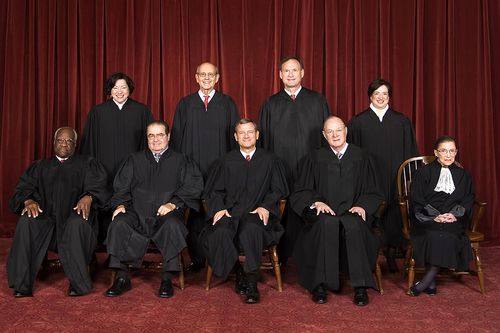As you know, the justices of the Supreme Court met in private today to discuss, among many other things, whether to take any of the marriage equality cases out of the Sixth Circuit.
If you recall, the Sixth Circuit upheld bans on the freedom to marry, making it the only federal appellate court in the post-Windsor world to do so. The plaintiffs in the various cases on appeal — from Michigan, Ohio, Kentucky, and Tennessee — appealed and asked the Supreme Court to take their cases and reverse the appellate court.
The justice considered those petitions in conference today.
But we didn't get an order granting or denying review. That's ok.
Why you shouldn't worry, AFTER THE JUMP…
1. The justices had a lot to discuss.
In addition to the other petitions waiting on the docket, they not only had to decide whether to take a marriage equality case, they had to decide which case to take. There are several, each with unique nuances that may make them better for review. Normally, the Supreme Court wants the cleanest case: the most straightforward facts, no procedural hurdles, clear legal questions. There is strategy involved here, too.
And there's more! The justices also had to decide how to craft the legal question they will review. In every petition for certiorari at the Court, the parties frame the legal question they say the Court must address. As any lawyer (or story teller) will tell you, how you frame the question is a big deal: it could tip the entire case in one direction. The justices have to decide whether to take the legal question as framed by a party or to change it to their liking or to take it and add questions they want answered. That kind of grant happens often.
2. It's Friday.
We are all happy it's Friday because, for most of us, that means the work week slows down. The justices may not have wanted to issue their orders on a Friday night. And, I venture to guess, the staff might not have wanted to, either. They may wait until Monday to publish their orders. As it is, when the Court meets on Mondays to discuss the docket, they just as often release orders the next day as that afternoon.
3. There is another conference coming up.
There is always another conference. The justices may have engaged in much discussion today and failed to come to any decisions about which cases to grant. They may pick up that discussion at their next conference, scheduled for next Friday.
4. There is still time.
Contrary to what some in the media have said, just because the justices did not grant review today does not mean everything will be pushed back to next term (the term starting October 15). There is still time. Be patient. And enjoy your weekend!
***
Follow me on Twitter and on Facebook.
Ari Ezra Waldman is a professor of law and the Director of the Institute for Information Law and Policy at New York Law School and is concurrently getting his PhD at Columbia University in New York City. He is a 2002 graduate of Harvard College and a 2005 graduate of Harvard Law School. Ari writes weekly posts on law and various LGBT issues.




